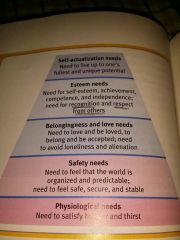![]()
![]()
![]()
Use LEFT and RIGHT arrow keys to navigate between flashcards;
Use UP and DOWN arrow keys to flip the card;
H to show hint;
A reads text to speech;
12 Cards in this Set
- Front
- Back
|
Instinct |
A complex behavior that is rigidly patterned throughout a species and is unlearned. |
|
|
Drive-reduction theory |
The idea that a physiological need creates an aroused tension state (a drive) that motivates an organism to satisfy the need. |
|
|
Incentive |
A positive or negative environmental stimulus that motivates behavior. |
|
|
Maslow's hierarchy of needs |

Pyramid of human needs, beginning at the base with physiological needs that must first be satisfied before higher-level safety needs and then psychological needs become active. |
|
|
Sexual response cycle |
The four stages of sexual responding described by Masters and Johnson - excitement, plateau, orgasm, and resolution. |
|
|
Refractory period |
A resting period after orgasm, during which a man cannot achieve another orgasm. |
|
|
Estrogen |
A sex hormone, secreted in greater amounts by females than by males. In nonhuman female mammals, this hormone's levels peak during ovulation, promoting sexual receptivity. |
|
|
Testosterone |
The most important of the male hormones. Both males and females have it, but the additional amount of this hormone in males stimulates the growth of the male sex organs in the fetus and the development of the male sex characteristics during puberty. |
|
|
Achievement motivation |
A desire for significant accomplishment: for mastery of things, people, or ideas; for attaining a high standard. |
|
|
James - Lange theory |
The theory that our experience of emotion is our awareness of our physiological responses to emotional arousing stimuli. |
|
|
Cannon-Bard theory |
The theory that an emotion arousing stimulus simultaneously triggers (1) physiological responses and (2) the subjective experience of emotion. |
|
|
Two-factor theory |
Schachter's theory that to experience emotion one must (1) be physically aroused and (2) cognitively label the arousal. |

